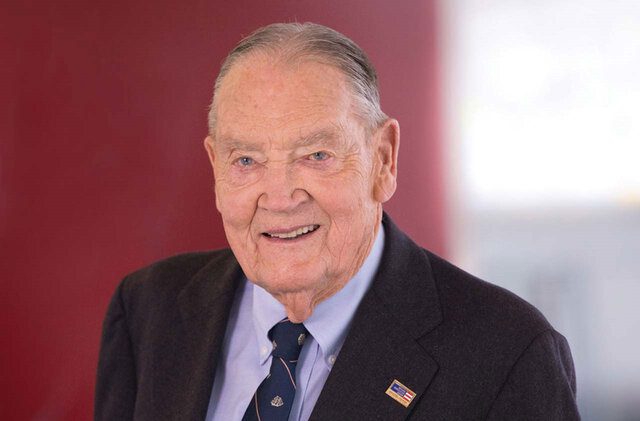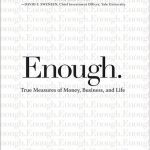“Life is a kind of campaign. People have no idea what strength comes to one’s soul and spirit through a good fight.” – Gutzon Borglum (sculptor of Mount Rushmore)
John C. Bogle was the founder and chief executive of The Vanguard Group and is credited with creating the first index fund. In 1999, Fortune named Bogle as “one of the four investment giants of the 20th Century.” alongside Warren Buffett, Peter Lynch, and George Soros. In his book, Enough: True Measures of Money, Business, and Life, Bogle shares great insights on what it truly means to have “enough” in a world increasingly focused on status and score-keeping. He also shared his principles on Money, Business, Life, and Leadership.
On Leadership
“What, then, are the characteristics of good leadership and of good management? On that subject, I have (surprise!) strong opinions, most of them formed in the crucible of my own six decades of business experience, including four decades as a leader—nine years as chief executive of Wellington Management, 22 years as chief of Vanguard, and (if you will) now nine years running Vanguard’s admittedly tiny Bogle Financial Markets Research Center, with its crew of three plus me. So here I speak from my own broad, firsthand, and often hard-won experience.”
10 rules for building a great organization
Rule 1: Make Caring the Soul of the Organization
When I first spoke to our Vanguard crew about caring in 1989, I used these words: “Caring is a mutual affair, involving:
(1) Mutual respect from the highest to the humblest among us: Each one of you deserves to be—and will be—treated with courtesy, candor, friendliness, and respect for the honorable work you perform.
(2) Opportunities for career growth, participation, and innovation: While Vanguard is an enterprise in which so many are asked to do jobs that are routine and mundane but always essential, the simple fact is that we need your enthusiastic participation in your job—whatever it may be—if we are to make Vanguard work effectively.
Rule 2: Forget about Employees
“To me, an employee suggested someone who came in each day at nine, left promptly at five, did what he was told, kept her mouth shut, and got paid, just like clockwork, when the workweek ended. A crew member, while it may sound sort of, well, corny, suggested to me an excited, motivated, committed—yes, caring—person who was part of a crew in which we all worked together on a worthwhile voyage, part of a chain that could be no stronger than its weakest link. That’s the kind of crew I wanted to lead, one linked together, each dependent on the other.”
Rule 3: Set High Standards and Values—and Stick to Them
As for values, I was determined from the outset to make human beings the focus of our firm. How often I have said over these long years that those whom we serve—and, let’s never forget, those with whom we serve as well—must be treated as “honest-to-God, down-to-earth human beings, all with their own hopes and fears and financial goals.” In practice, that means together serving the human beings who are our clients to the best of our ability; being prudent stewards of the assets they have entrusted to us; treating them as we would like the stewards of our own assets to treat us; and serving them with candor, with empathy, with fair dealing, and with integrity.
“In my time as head of Vanguard, none of these standards and values was ever written down in a manual. Rather, I proposed a single overarching but simple rule:
“Do what’s right. If you’re not sure, ask your boss.” Why so? Because as I’ve said a thousand times: “Good ethics is good business.” A new thought? Hardly. In the Odyssey, Homer reminds us,
“Fair dealing brings more profit in the end.“
Rule 4: Talk the Talk. Repeat the Values Endlessly.
Building a great organization demands finding the right words to communicate the best ideas and the highest ideals, words that convey purpose and passion and vision. In the effort to do so, we have all been given a priceless gift: the English language. Let’s use the inspirational words and cadences it has given us to build an organization that lasts, an organization in which leaders, managers, and those who do the hard work of routine can take great pride.
Rule 5: Walk the Walk. Actions Speak Louder than Words.
Whether manager or leader, there are few more self-defeating courses of action than “talking the talk” without “walking the walk.” So whatever you preach, you’d darn well better practice. The principle is simple: If you want to be trusted, be trustworthy. If you demand hard work, work hard. If you want your colleagues to level with you, level with them. It’s not very complicated!
Personal visibility is one of the key elements of leadership, and it doesn’t happen when you’re sitting behind your desk. And if you’re an executive—a “suit,” in common parlance—don’t limit your ambit to conference rooms filled with other suits. Get out and meet the people who are doing the real work: those in the mail room, the security guards, the programmers, the accountants, the money managers, everyone upon whom your daily work depends.
If you demand hard work, work hard. If you want your colleagues to level with you, level with them. It’s not very complicated!
Rule 6: Don’t Overmanage
As I have earlier noted, the most important things in life and in business can’t be measured. The trite bromide “If you can measure it, you can manage it” has be measured. The trite bromide “If you can measure it, you can manage it” has been a hindrance in building a great real-world organization, just as it has been a hindrance in evaluating the real-world economy. It is character, not numbers, that make the world go ’round. How can we possibly measure the qualities of human existence that give our lives and careers meaning? How about grace, kindness, and integrity?
What value do we put on passion, devotion, and trust? How much do cheerfulness, the lilt of a human voice, and a touch of pride add to our lives? Tell me, please, if you can, how to value friendship, cooperation, dedication, and spirit. Categorically, the firm that ignores the intangible qualities that the human beings who are our colleagues bring to their careers will never build a great workforce or a great organization.
Rule 7: Recognize Individual Achievement
In Vanguard’s early days, we were among the first firms to create a formal employee recognition program. It began, as I recall, in about 1980, and remains intact and virtually unchanged today. Each quarter, I would appear before a group of crew members and present the Vanguard Award for Excellence to one of the inevitably astonished colleagues. The award, based on nominations from one’s peers and reviewed by a committee of officers, is given for special team spirit, cooperation, exemplary service to clients and crew members, initiative, and resourcefulness. Some six to ten awards were presented each quarter and included a $1,000 check, $500 to the crew member’s favorite charity, and a plaque with the motto “Even one person can make a difference.” The Award for Excellence remains in place to this day.”
“The point isn’t to make recipients rich, but to recognize achievement, reinforcing an unshakable belief in the value of the individual to the organization as a whole. Even though I am no longer the company’s chief executive, I continue to sit down in my office with each award winner for an hour or so of conversation, at once listening and talking, learning and teaching, getting acquainted, and giving each winner a special signed copy of one of my books with a bookplate commemorating the award. Small as they may seem, these human touches in a now giant enterprise will, I’m certain, help to preserve the legacy I’ve tried to create.
Rule 8: A Reminder—Loyalty Is a Two-Way Street
Rare is the high-ranking corporate officer who doesn’t call on his or her workforce to display loyalty, but too many managers stop there. The best leaders, however, make certain they give loyalty back in equal measure. As I told our crew back in 1988, “It is really incredible that it has taken most American companies so long to realize that it is simply not right to ask those who do the daily work to be loyal to the corporation without making the same commitment, with the same fervor, that the corporation will be loyal to them in return. And that concept of two-way loyalty must itself become a Vanguard tradition.
Rule 9: Lead and Manage for the Long Term
Leading a business is a serious, rugged, flaw-ridden, demanding task. Dog-eat-dog competition keeps managers and the members of the workforce on their toes, and the inevitable fluctuations and vicissitudes in an industry’s affairs, as well as in the general level of economic activity, often seem to compel painful decisions and trade-offs to meet the exigencies of the day. But leading a business is also thrilling, challenging, and rewarding. The key to the difference, I believe, lies in doing everything possible to focus on long-term opportunities, doing your best to ignore the inevitable short-term difficulties.
“Once you decide whether you expect to be in business for a short time or a long time, most of the right decisions are easy.”
Rule 10: Press On, Regardless
If there were a single phrase that best articulates the attitude of business leaders and managers who both deserve and reward a great workforce, it would be “press on, regardless.” It is a rule of life that has been a motto of my family for as long as I can remember, and has sustained me through times thick and times thin alike.
The motto’s provenance was an old lobster boat named Press On owned by my uncle, investment banker Clifton Armstrong Hipkins. On the little bridge was a framed copy of these words from President Calvin Coolidge:
“Nothing in the world can take the place of persistence. Talent will not;nothing is more common than unsuccessful men with talent. Genius will not; unrewarded genius is almost a proverb. Education will not; the world is full of educated derelicts. Persistence and determination alone are omnipotent. The slogan “Press on” has solved, and always will solve, the problems of the human race”
A caution: Many leaders intuitively understand the need to press on when the weather is stormy and the going is hard. Far fewer, it seems to me, understand the need also to press on when the weather is sunny and the going is easy. Yet leaders and managers alike need to be reminded that the good times as well as the bad will pass away. The best course that I know is to keep pressing forward, no matter the circumstances.
Like all great sentiments, the idea of pressing on is hardly new. St. Paul urged his flock to do as he did, and “press to the mark.” Two and a half millennia earlier, the last words written by Buddha expressed the identical sentiment: “Strive on, diligently.”
Bogle closed his book, Enough: True Measures of Money, Business, and Life, with his philosophy of life and what make him strive. He writes:
“Back in 2007, I was invited to give a talk at a CEO Leadership Summit sponsored by Yale University. Since I was bound to be the old warhorse among the group, I settled on a subject that I thought would be both retrospective and prospective: “Why Do I Bother to Battle?” It happened that the television writers were on strike at the time, so on the theory that the summit participants might be suffering from an absence of late-night humor, I decided to frame my talk as one of those inverse “Top Ten” lists from the Late Show with David Letterman.”
“As comedy, my list might be wanting. (Remember, I was an economics major!) But as a summation of what has pushed me on during my entire life and what continues to push me on today, it’s right on the mark.”
10. Damned if I know why I bother to battle. I just do it, and I don’t know how to stop.
9. Because, in all the nearly nine decades of my life I’ve never done anything but battle—as a boy delivering newspapers; then as a young man working as a waiter (in many venues), ticket seller, mail clerk, cub reporter, runner for a brokerage firm, even a pinsetter in a bowling alley (as I wrote earlier, a Sisyphean battle!); and as a man, fighting the battle for personal advancement, for attention, for innovation, for progress, for service to society, and yes, even for power and the hope of being remembered. (Might as well admit it!) That’s one reason why I write books, including this one.
8. Because the great battlers of history have always been my heroes. Think Alexander Hamilton. Think Teddy Roosevelt. Think Woodrow Wilson. Heck, think Philadelphia’s own Rocky Balboa.
7. Because all those battlers, finally, lost their battles. I battle to be the exception.
6. Because, in the mutual fund field, no one else in the system is exception.
6. Because, in the mutual fund field, no one else in the system is battling to bring back our traditional values of trusteeship and our high promise of service to investors. Someone’s got to do it. By the process of elimination, I got the job.
5. Because when the battler stands pretty much alone, he draws a lot more attention to the mission. If you have a large ego (I do), that’s a nice extra dividend, especially because those who are outside the system—our “man in the street” investors, exemplified by the Bogleheads of the Internet—give me the strength to carry on.
4. Because, sad to say, I no longer play squash, and playing golf on grown-up courses is now something of a stretch. So what else can I do but transfer the spirit of those old battles on the fields of athletic combat onto the fields of combat to improve our society at large?
3. Because what I’m battling for—building our nation’s financial system anew, in order to give our citizen/ investors a fair shake—is right. Mathematically right. Philosophically right. Ethically right. Call it idealism, and it’s as strong today as—maybe even stronger than—it was when I wrote that idealistic Princeton thesis 57 years ago. How could an idealist fail to fight such a battle?
2. Because, even as I battle, I love the give-and-take, the competition, the intellectual challenge of my field, the burning desire to leave everything that I touch better than I found it. Using Robert Frost’s formulation, my battle is “a lover’s quarrel” with our financial world.
1. Simply because I’m a battler by nature—born, bred, and raised to make my own way in life. Such a life demands the kind of passion evoked by the words of the great sculptor of Mount Rushmore, Gutzon Borglum: “Life is a kind of campaign. People have no idea what strength comes to one’s soul and spirit through a good fight.”
All the Best in your quest to get Better. Don’t Settle: Live with Passion.



1 Comment
Pingback: On Leadership. – Lanre Dahunsi